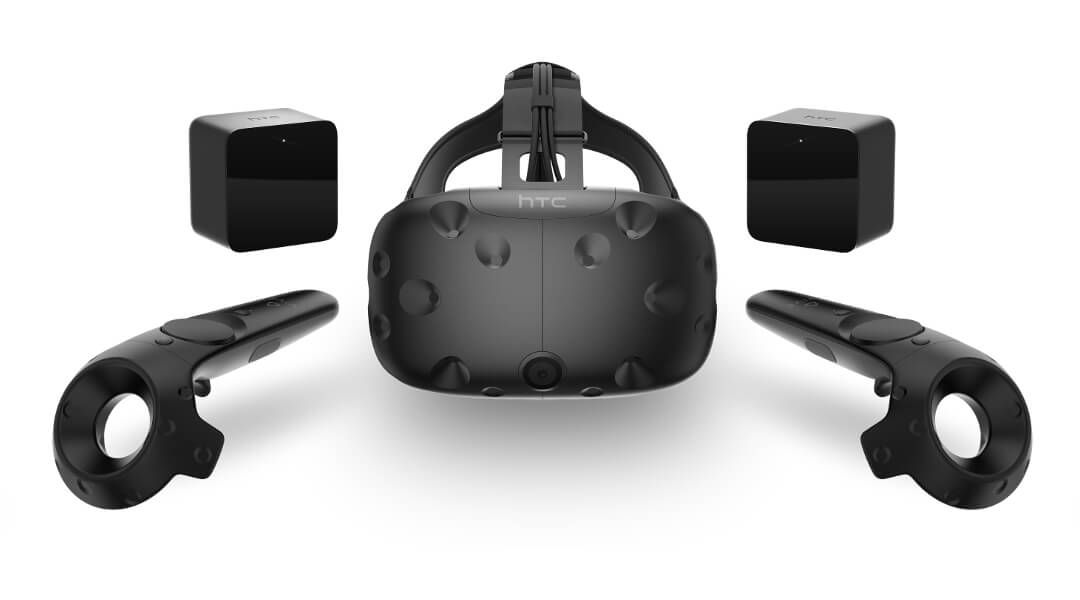HTC is announcing that their Vive VR headset will retail for $799 and launches in early April, bundled motion controllers, sensors and two VR games.
Despite a delay out of late 2015/early 2016, HTC has remained committed to their promise of a competitive high-end VR headset. Today they delivered the final details regarding that headset's price, launch, and bundled content. The HTC Vive will cost $799, launch in early April, and come with two motion controllers, two Lighthouse sensors and two free VR games. HTC has delivered on their promise, and 2016's VR dawn is less than two months away.
Specifically, the HTC Vive comes bundled with virtually everything one needs to enjoy the headset's full 360 degree tracking and room-scale VR technology. The two wireless motion controllers feature 24 sensors designed for constant communication with the Lighthouse sensors. Each controller features a trackpad, a dual-stage trigger and several additional buttons. The Lighthouse sensors are designed for any room configuration, constantly communicating with both controllers and the headset itself. The HTC Vive does not, however, include integrated audio. Bring your own headphones.
As for the headset itself, the HTC Vive features 32 individual sensors on the front and sides of the goggles. Each eye has its own screen for a collective 2160 x 1200 combined resolution with 110 degrees of field of view, refreshing at 90hz. Added for the final version of the HTC Vive is the front-facing camera which is key to the Constellation system, a reality x VR system designed to help players from running into objects with the headset still on. Changes were also made to the straps and back-plate, now adjustable and designed for comfort.
[HTML1]
HTC also announced two bundled games that will come with the headset. Those games are Job Simulator and Fantastic Contraption. Job Simulator places the player in a virtual restaurant kitchen for robots, putting together all manner of dishes together for stupid robots who don't understand what food is anyway. Fantastic Contraption provides its players with all the tools they need to build a machine meant to get from A to B, overcoming all manner of obstacles. Both games feature full motion controls and 360 degree room-scale VR.
And of course the HTC Vive will be powered by Steam VR software, which is a promise as much as it is a feature. Steam VR software means the HTC Vive will remain updated by Valve for the foreseeable future, ensuring all VR games released through Steam run smoothly. It's also a platform agnostic base, so HTC Vive early adopters can rest easy knowing future headset launches from HTC or otherwise won't mean the end of their current headset's lifespan.
Perhaps the greatest measurement of HTC's announcement is its direct comparison to its competitor the Oculus Rift. Not only will the HTC Vive launch with motion controls, which the Rift won't have until late 2016, but it managed to nearly match its price point when considering the extra costs of the controllers. The Rift's at $599, the Vive's at $799, and it's not a stretch to imagine that the Rift's Touch controllers will cost $200 later this year. The actual quality and value of each headset won't be decided until they each launch, but HTC's done its job.
So which headset should VR early investors pick up? That's going to be a difficult decision. Oculus has had much longer to prepare for the debut of VR -- they'll have their own storefront at launch, they're supporting VR development with their funds, due to the Gear VR headset they have a foundation of content built for VR day one, and their headset has been iterated on a number more times than HTC's done on the Vive. But, the Vive has launch day motion controls and room-scale VR. Do you want to wade into the VR ocean from the beach, or get dropped off in the middle of the ocean with no land in sight?
The HTC Vive VR headset will retail for $799 and launches beginning in early April, with quantity likely to be heavily limited. Pre-orders start on February 29 at 10:00AM ET.

